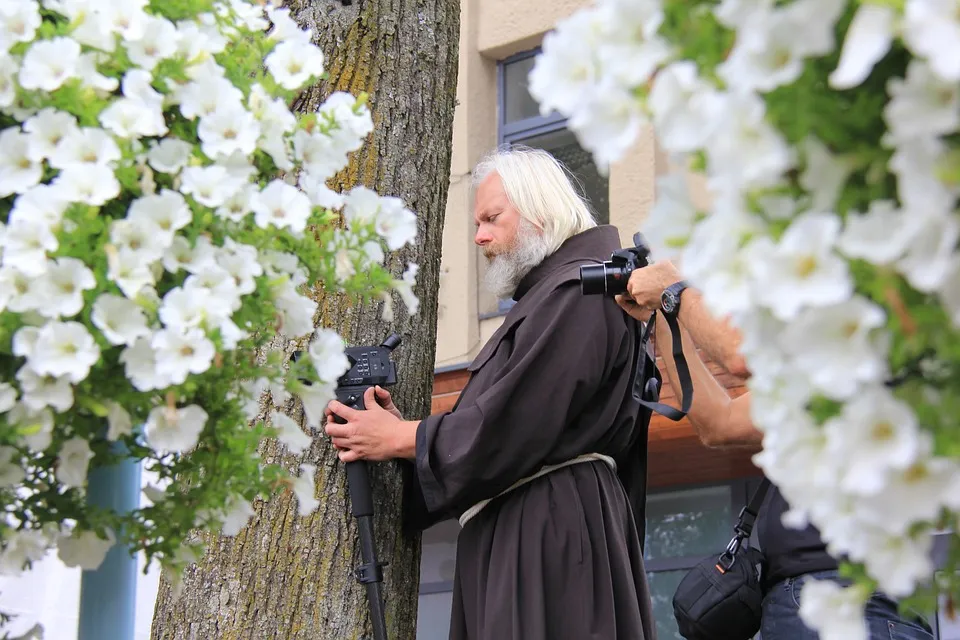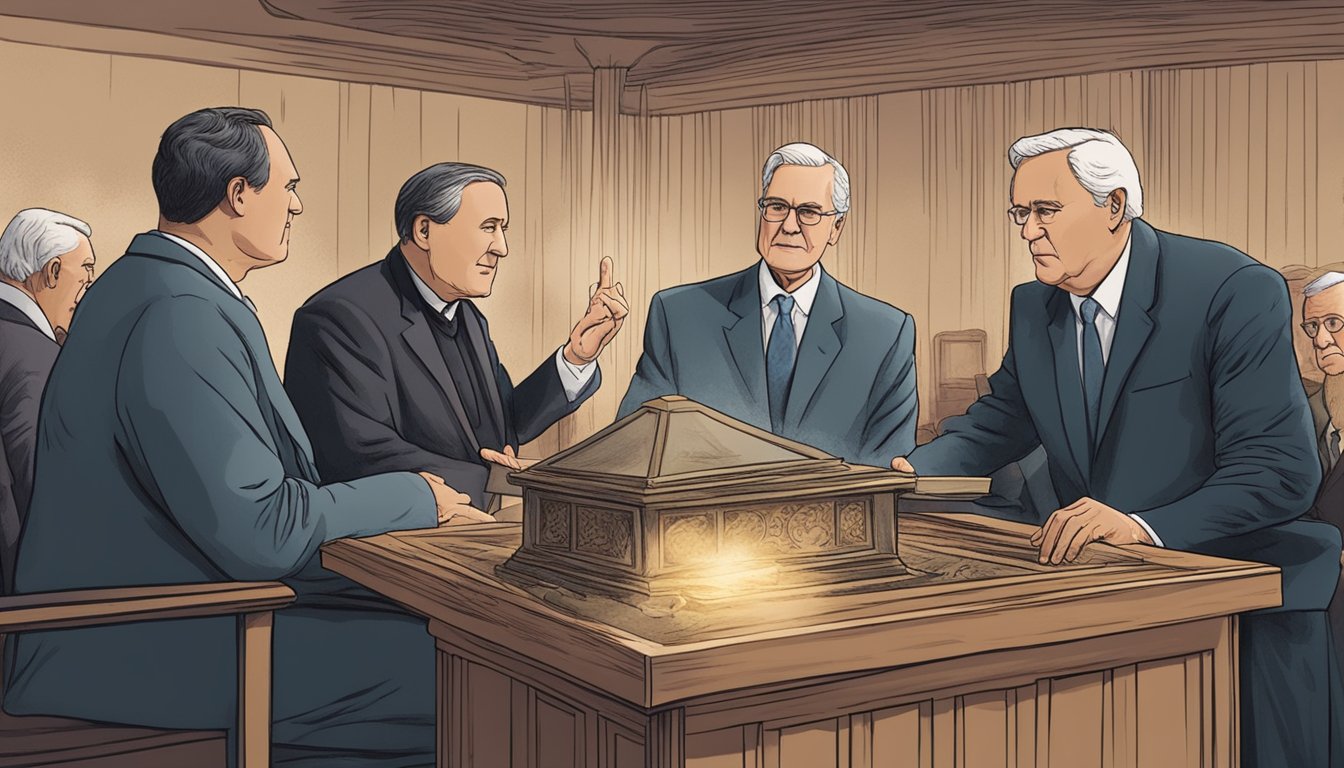Many Christians are faced with the difficult decision of what to do with their loved one’s remains after they pass away. One question that often arises is whether it is a sin for a Christian to be cremated. While the Bible does not provide a clear answer on this matter, there are various biblical references and theological debates that shed light on this topic.

The concept of cremation in Christian doctrine has been a subject of debate for centuries. Some argue that cremation goes against the biblical concept of the body as a temple of the Holy Spirit and that burial is a more appropriate way to honor the dead. Others believe that cremation is a practical and acceptable option, as long as it is not done for pagan or superstitious reasons. Ultimately, the decision of whether to cremate or bury a loved one’s remains is a personal one that should be made with careful consideration of one’s faith, cultural traditions, and practical considerations.
Key Takeaways
- The Bible does not provide a clear answer on whether it is a sin for a Christian to be cremated.
- Theological debates and cultural traditions have shaped Christian views on cremation versus burial.
- Ultimately, the decision of how to handle a loved one’s remains is a personal one that should be made with careful consideration of one’s faith and practical considerations.
Biblical References to Death and Burial
Old Testament Practices

In the Old Testament, the Israelites practiced burial as a way to dispose of human bodies. They buried their dead in caves, tombs, or in the ground, as evidenced in Genesis 23:19; 35-19; and 2 Chronicles 16. For example, when Sarah, Rachel, and Rebekah’s nurse died, they were buried soon after their death (Genesis 23:1-20, 35:19-20, and 35:8).
In 1 Samuel 31, Saul and his sons were killed in battle, and their bodies were taken by the Philistines. The people of Jabesh-gilead risked their lives to retrieve the remains of Saul and his sons and buried them under a tamarisk tree.
New Testament Insights
In the New Testament, there are no recorded instances of cremation. Some Christians argue that it is inconsistent with their faith to burn the remains of the dead, given that they have been saved by faith from the coming judgment of fire. However, others do not view cremation as a spiritual issue.
For example, in 1 Corinthians 15:35-44, Paul wrote about the resurrection of the dead and the transformation of the body. He compared the body to a seed that is sown in the ground and then raised up in a new form. In Ecclesiastes 3:20, it says that all go to the same place; all come from dust, and to dust all return.
In conclusion, the Bible does not provide a clear answer about whether cremation is a sin for Christians. However, it does provide examples of burial practices in the Old Testament and insights about the resurrection of the dead in the New Testament. Ultimately, the decision of whether to cremate or bury a loved one is a personal one that should be made with careful consideration and respect for the deceased.
The Concept of Cremation in Christian Doctrine
https://www.youtube.com/watch?v=CxyDVykdVvE&embed=true
Cremation is the practice of burning a deceased body into ashes. This practice has been around for centuries and has been adopted by different cultures and religions. In the Christian faith, the concept of cremation has been a topic of debate for a long time. Some Christians believe that cremation is a sin, while others believe that it is an acceptable practice.
Historical Views on Cremation
Early Christians did not practice cremation, as they believed in the resurrection of the body. The Catholic Church prohibited cremation in the 5th century, and this ban lasted until 1963 when the Church lifted the ban. During the Middle Ages, cremation was considered a pagan practice and was associated with witchcraft and heresy.
Modern Christian Perspectives
Today, many Christian denominations have no objection to cremation. The National Funeral Directors Association reports that more than 50% of Americans now choose cremation over traditional burial. Many Christians believe that cremation is a matter of personal preference and that it does not affect the soul or the afterlife.
However, some Christians still believe that cremation is a sin. They argue that the body is a temple of the Holy Spirit and should be treated with respect. They also believe that cremation is a denial of the resurrection of the body.

In conclusion, the concept of cremation in Christian doctrine has been a topic of debate for centuries. While some Christians believe that it is a sin, many others see it as a personal choice. The decision to be cremated or buried should be made based on personal beliefs and preferences.
Christian Views on the Human Body and Soul
https://www.youtube.com/watch?v=lJjUTVMMiYk&embed=true
The Body as a Temple
Christians believe that the human body is a temple of the Holy Spirit, and therefore it should be treated with respect and dignity. The body is the physical manifestation of the person and reflects the image of God. As such, Christians believe that the body should be treated with reverence, even in death.
The Bible teaches that the body will be resurrected at the end of time, and Christians believe that the body should be preserved in a manner that reflects this belief. Some Christians believe that cremation is not an appropriate way to treat the body, as it destroys the physical form and does not allow for the possibility of resurrection. However, other Christians believe that cremation is acceptable, as the body will be resurrected in a spiritual form.
The Soul’s Eternal Journey
Christians believe that the soul is eternal and will continue to exist after physical death. The soul is the spiritual essence of a person and is not tied to the physical body. Christians believe that the soul will be judged by God after death and will either be rewarded with eternal life or punished with eternal damnation.
While the body is important, Christians believe that the soul is the most important aspect of a person. Therefore, the treatment of the body after death is not as important as the state of the soul. Christians believe that the soul will continue its journey after death, and the state of the body will not affect this journey.
« Is ‘The Sound of Freedom’ a Christian Movie? Exploring the Movie’s Themes and Messages
Is Essentials a Christian Brand? Exploring the Origins and Values of the Popular Clothing Line »
In conclusion, while Christians have varying opinions on cremation, the most important aspect is the state of the soul. Christians believe that the body should be treated with respect and dignity, but ultimately the state of the soul is what matters.
Theological Debate on Cremation vs Burial
https://www.youtube.com/watch?v=5I0TNgmnfS8&embed=true
When it comes to the topic of cremation versus burial, there is a theological debate within the Christian community. Some Christians believe that cremation is a sin, while others believe it is a matter of personal preference.
Resurrection and Physical Remains
One argument against cremation is that it goes against the Christian belief in the resurrection of the body. The body is seen as a temple of the Holy Spirit and should be treated with respect. Burial is seen as a way to honor the body and prepare it for resurrection.

On the other hand, some Christians argue that the physical remains of the body are not necessary for the resurrection. God is capable of resurrecting a body regardless of whether it was buried or cremated.
Cremation and Christian Freedom
Another argument in favor of cremation is the idea of Christian freedom. The Bible does not explicitly condemn cremation, and therefore, it is up to the individual to decide whether to be buried or cremated.
Furthermore, cremation can be a practical choice for some families. It is often less expensive than a traditional burial and can be more environmentally friendly.
In the end, the decision to be buried or cremated is a personal one. Christians should consider their beliefs and values, as well as their practical needs and preferences. While there is a theological debate on the topic, ultimately, it is up to each individual to decide what is best for them.
Cremation in the Context of Sin and Redemption
https://www.youtube.com/watch?v=dVzm6swWUcQ&embed=true
Sin and Its Consequences

Christians believe that sin entered the world through Adam and Eve’s disobedience to God in the Garden of Eden. Sin is an act that violates God’s law and brings spiritual death and separation from God. The Bible teaches that the wages of sin is death (Romans 6:23). Death is the ultimate consequence of sin and a reminder of our mortality.
Cremation, as a means of disposing of the dead, is not explicitly mentioned in the Bible. However, some Christians believe that cremation is a sin because it involves the destruction of the body, which is considered the temple of the Holy Spirit (1 Corinthians 6:19-20). They argue that cremation shows a lack of respect for the body and is a rejection of the Christian belief in the resurrection of the dead.
Redemption and Christian Practices
Other Christians view cremation as a matter of personal preference and not a sin. They believe that the body is just a temporary vessel and that the soul is the more important aspect of a person. They argue that God has the power to resurrect the dead, regardless of how the body was disposed of. They also point out that cremation is a more affordable option compared to traditional burial, which can be a significant factor for some families.
The Bible does not condemn cremation explicitly. In fact, there are instances in the Bible where bodies were burned, such as in the case of Saul and his sons (1 Samuel 31:12) and the Israelites who died of a plague (Numbers 16:46-50). However, it is important to note that these instances were not done out of personal preference but rather as a means of punishment or necessity.
In conclusion, the issue of cremation and sin is a matter of personal belief and interpretation. Christians should respect each other’s views and make their own decision based on what they believe is right. Ultimately, the Christian belief in redemption through Jesus Christ offers hope beyond death and reminds us that death is not the end but a gateway to eternal life.
Cultural and Historical Practices of Cremation

Cremation is a practice that has been performed by various cultures throughout history. It is important to understand the cultural and historical significance of cremation to better understand its place in modern society.
Jewish and Pagan Traditions
In Jewish tradition, burial is considered the preferred method of disposal of the deceased. This is due to the belief that the body is a vessel for the soul and should be treated with respect. However, there are some instances in Jewish history where cremation was used, such as during times of war or when it was necessary to transport the body long distances. In pagan traditions, cremation was often used as a way to release the soul from the body and allow it to move on to the afterlife.
Adoption in Christian Societies
Cremation was not widely accepted in Christian societies until the 20th century. Prior to this, burial was the preferred method of disposal of the deceased. This was due to the belief in the resurrection of the body, which was seen as a necessary part of the afterlife. However, as cremation became more common and accepted in society, many Christian denominations began to adopt it as an alternative to burial.
In modern times, cremation is a common practice and is often included as an option in funeral services. It is important to note that while some Christian denominations still prefer burial, there is no biblical prohibition against cremation. Ultimately, the decision to choose cremation or burial is a personal one and should be made based on individual beliefs and preferences.
Practical Considerations and Personal Choices

Sanitation and Land Use
One of the main practical considerations when deciding between cremation and traditional burial is sanitation and land use. Cremation is often seen as a more sanitary option since it eliminates the need for embalming and the use of chemicals. Additionally, traditional burials require the use of land for gravesites, which can be a concern in areas where land is scarce or expensive.
On the other hand, cremation chambers require a significant amount of energy to operate, and the process can release harmful emissions into the environment. Additionally, some people may feel that cremation is not a respectful way to treat the deceased, as the body is reduced to ashes.
Personal Beliefs and Decisions
Ultimately, the decision to choose cremation or traditional burial is a personal one that should be based on individual beliefs and preferences. Some people may choose cremation because it aligns with their religious or spiritual beliefs, while others may choose traditional burial because it provides a sense of closure and allows for a physical place to visit and remember the deceased.
It is important to note that cremains can be buried in a cemetery or kept in an urn, providing a physical location for loved ones to visit. Additionally, some people choose to scatter cremains in a meaningful location, such as a favorite hiking trail or body of water.

In the end, the decision to choose cremation or traditional burial should be made based on personal beliefs, practical considerations, and individual preferences.
The Process of Cremation and Its Symbolism
https://www.youtube.com/watch?v=ul5G3nLeTOA&embed=true
Cremation is the process of burning a deceased person’s body to ashes. This practice has become more popular in recent years as an alternative to traditional burial. The process involves placing the body in a cremation chamber, where it is subjected to high temperatures of 1800-2000 degrees Fahrenheit. This intense heat reduces the body to its basic elements, leaving behind only bone fragments and ashes.
From Ashes to Ashes
The phrase “ashes to ashes, dust to dust” is often used in connection with cremation. It is a reference to the biblical passage found in Genesis 3:19, which states that humans were made from dust and to dust they shall return. Cremation is seen as a way of returning the body to its basic elements, fulfilling this biblical prophecy.
Symbolic Meanings of Fire and Ashes
Fire has long been associated with purification and renewal. In many cultures, fire is seen as a symbol of transformation and rebirth. Cremation is seen as a way of purifying the body and releasing the soul from its earthly vessel. The ashes that remain after the process are often scattered in a place that has special meaning to the deceased or their loved ones.

The ashes can also serve as a physical reminder of the deceased person. Some people choose to keep the ashes in an urn or other container, while others may choose to scatter them in a meaningful location. Regardless of what is done with the ashes, they serve as a symbol of the person’s life and legacy.
While cremation is becoming more popular, there are still some who believe that it is a sin for a Christian to be cremated. However, there is no biblical basis for this belief. The Bible does not explicitly forbid cremation, and many Christians see it as a viable option for burial. Ultimately, the decision of whether to choose cremation or traditional burial is a personal one, and should be made based on individual beliefs and preferences.
In conclusion, while cremation may not be for everyone, it is a valid option for those who choose it. The process of cremation and the symbolism of fire and ashes can provide comfort and closure for the loved ones of the deceased.
Coping with Grief and the Role of Funerals
https://www.youtube.com/watch?v=J5V5c6Zec3g&embed=true
Losing a loved one is one of the most difficult experiences anyone can go through. Coping with grief is a challenging process that requires time and support from family and friends. Funerals can play an important role in this process, providing a space for loved ones to come together to mourn, remember, and celebrate the life of the deceased.
Funeral Services and Mourning

Funerals are a time for mourning and saying goodbye to a loved one. They provide an opportunity for family and friends to gather together to express their grief and offer support to one another. During a funeral service, loved ones can share memories and stories about the deceased, which can help bring comfort and closure to those who are grieving.
Celebrating Life and Legacy
While funerals are often associated with mourning and sadness, they can also be a time to celebrate the life and legacy of the deceased. Celebrating the life of a loved one can help bring a sense of closure and healing to those who are grieving. This can include sharing stories and memories, playing music, or displaying photos and other mementos.
Ultimately, the purpose of a funeral is to provide a space for loved ones to come together to mourn, remember, and celebrate the life of the deceased. While the process of coping with grief can be difficult, it is important to remember that death is not the end. For Christians, death is a transition into glory and the newness of life in Christ.
Influential Christian Leaders on Cremation
John MacArthur and Other Theologians
The topic of cremation has been debated among Christians for many years. Some believe that it is a sin to be cremated, while others believe that it is a personal choice. John MacArthur, a prominent Christian theologian, has stated that he believes that cremation is not a sin, but that it is important to consider the biblical principles of honoring the body and showing respect for the dead.

MacArthur is not alone in his beliefs. Other Christian theologians, such as Wayne Grudem and J.I. Packer, have also stated that they do not believe that cremation is a sin. They believe that the Bible does not specifically address the issue of cremation, and that it is up to each individual to make their own decision based on their personal beliefs and convictions.
However, some Christians believe that cremation goes against the teachings of the Bible. They point to verses such as Genesis 3:19, which states that “dust you are, and to dust you shall return,” as evidence that the body should be buried in the ground. They also argue that cremation was not practiced by the early Christians, and that it is a pagan practice that goes against the teachings of the Bible.
Despite these differing opinions, it is important for Christians to remember that the decision to be cremated or buried is a personal one. It is important to consider the biblical principles of honoring the body and showing respect for the dead, but ultimately the decision should be based on what the individual believes is best for them and their loved ones.
Overall, while there is no clear consensus on the issue of cremation among Christian leaders, it is important for Christians to approach the topic with an open mind and a willingness to engage in respectful dialogue with those who hold different beliefs.
Frequently Asked Questions
https://www.youtube.com/watch?v=UAgegUFHx4g&embed=true
What does Christian doctrine say about cremation versus traditional burial?
Christian doctrine does not explicitly forbid cremation, and most Christian traditions, including evangelicals, consider it an ethical option. However, the weight of Christian tradition clearly favors burial. As Timothy George says, “While the Bible nowhere explicitly condemns cremation, the consensus among most Christian traditions, including evangelicals, is that burial is the preferred option.”
Can Catholics choose cremation without conflicting with their faith?
The Catholic Church has historically preferred burial over cremation, but it now allows cremation as long as it is not chosen for reasons that are contrary to Christian doctrine. The ashes must be treated with respect and cannot be scattered or divided among family members. The Church also recommends that the ashes be buried in a cemetery or placed in a mausoleum.
How do different denominations within Christianity view cremation?
Different denominations within Christianity have varying views on cremation. For example, the Eastern Orthodox Church prohibits cremation, while the Lutheran Church allows it. The Anglican Church and the United Methodist Church both permit cremation, but recommend that the ashes be buried or entombed.
Does choosing cremation affect the Christian belief in resurrection?
Cremation does not affect the Christian belief in resurrection, as Christians believe that God has the power to resurrect the dead regardless of how their bodies were disposed of. However, some Christians may prefer burial as a way to symbolize their faith in the resurrection of the body.
What scriptural passages do Christians reference regarding cremation?
The Bible does not explicitly mention cremation, but Christians may reference passages such as Genesis 3:19 (“for dust you are and to dust you will return”) and Ecclesiastes 3:20 (“All go to the same place; all come from dust, and to dust all return”) to support the idea of burial.
Are there any biblical figures who were cremated, and what does that imply?
There are a few instances in the Bible where bodies were burned, such as the bodies of King Saul and his sons (1 Samuel 31:12) and the wicked queen Jezebel (2 Kings 9:30-37). However, these instances do not necessarily imply that cremation is a preferred method of body disposal.















